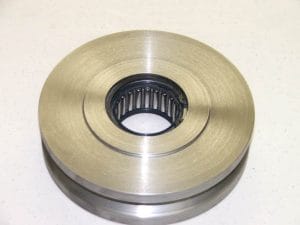Five Considerations When Choosing a Sheave Material

When buying a sheave, it is common for people to overlook the sheave material as a purchasing factor. However, the material you choose impacts various elements of your sheave: including toughness, abrasive & chemical resistance, weight, and temperature range. These five factors are very important for ensuring you get the suitable sheave material for your application. Continue reading to learn about how these five factors affect your sheave.
Toughness:
Material toughness determines the overall strength of your sheave. By choosing a material with high strength qualities like Gar–Dur, it will give you the ability to put the sheave under heavy loads. Another benefit of choosing a strong material is it will increase impact resistance. Increasing impact resistance means your sheave will be able to withstand extra force for short periods of time.
Abrasive Resistance:
Abrasive resistance is a material's ability to resist repeated sawing and scuffing from cable, wire, and other materials. A material such as Nylon has excellent abrasion resistance, meaning the sheave will stay in better shape and most likely increase service life. The less external damage to your sheaves, the better they will perform.
Chemical Resistance:
Chemical resistance refers to a material's ability to withstand penetration, corrosion, or breakdown in extreme environments, such as water, acid, and harsh sunlight. If you need a sheave that will regularly be used in outdoor environments, choosing a material with excellent chemical resistance is recommended. One sheave material that is ideal for outdoor environments is stainless steel due to its high level of corrosion resistance.
Weight:
Weight is a crucial consideration for sheave material. Weight plays a factor in the speed of your sheave and also affects the center of gravity, balance at high RPM, and determines force on structures when combined with loads. If you are looking for good lightweight sheave material options, we recommend Cast Nylon.
Temperature Range:
When choosing a sheave material, consider the environment that the material will be exposed. Suppose the sheave will be operating in an environment with a lot of temperature fluctuation or exposed to extreme cold and heat. In that case, you will need material that can still offer high-level performance. If you need a suitable material in a range of temperatures, Gar-Dur is a great option, but if you need your material to perform at a higher temperature, choose Ceram-P(TM) Filled UHMW.
By carefully considering each of these five factors when choosing a sheave material, you are sure to get a suitable sheave for your application's needs. If you want to learn about the wide range of sheave materials available at eSheaves, check out our material page here. Alternatively, if you have any questions, we can help! Reach out to us by email through sales@esheaves.com or by phone at 800-321-5667.